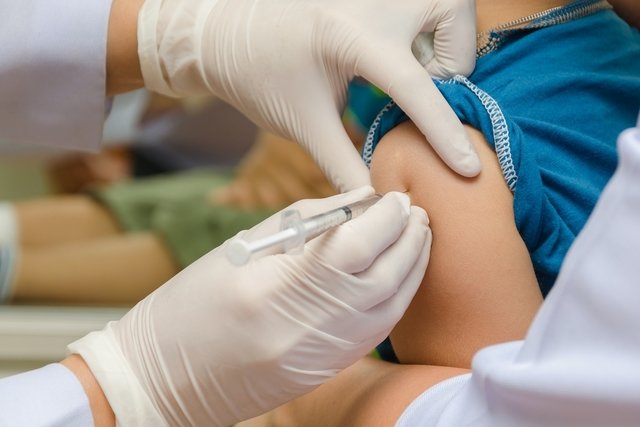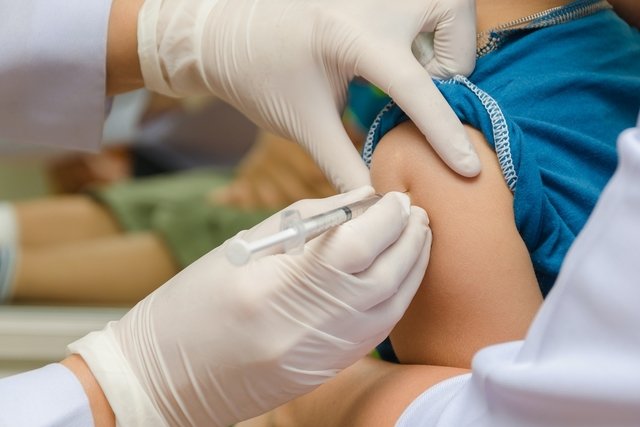Some situations can be considered contraindications for the administration of vaccines, as they can greatly increase the risk of side effects, as well as cause complications that are more serious than the disease itself, against which you want to be vaccinated.
The main cases in which vaccination is contraindicated in children by the Ministry of Health include:
- Have had a severe allergic reaction to a previous dose of the same vaccine;
- Have a proven allergy to any of the components of the vaccine formula, such as egg protein;
- Have a fever above 38.5ºC;
- Be taking any treatment that affects the immune systemsuch as chemotherapy or radiotherapy;
- Being treated with high doses of corticosteroids for immunosuppression;
- Have some type of cancer.
It is important to remember that non-vaccination is an extremely important decision and should only be considered when there is a serious risk to the child. For this reason, temporary situations, such as treatment with corticosteroids, therapies that affect the immune system or fever above 38.5ºC, for example, are contraindications that just postpone the moment of vaccination, and vaccination should be done as soon as the pediatrician recommends it.
Check out 6 good reasons to get vaccinated and keep your record updated.

Special situations that must be evaluated by the doctor
The main special situations that must be evaluated by the pediatrician in order to authorize vaccination are:
- Children with HIV: vaccination can be carried out according to the status of HIV infection, and children under 18 months of age, who do not present changes in the immune system and who do not have symptoms indicative of weakening of the immune system can follow the vaccination schedule vaccination;
- Children with severe immunodeficiency: each case must be carefully evaluated by the doctor, but, normally, vaccines that do not contain live attenuated agents can be administered.
Furthermore, if the child has received a bone marrow transplant, it is very important that they be referred to the CRIE, or Reference Center for Special Immunobiologicals, between 6 and 12 months after the transplant, to undergo revaccination as indicated.
Cases that do not prevent vaccination
Although they may appear to be contraindications for vaccination, the following cases should not prevent the administration of vaccines:
- Acute illness without fever, as long as there is no history of serious illness or respiratory tract infection;
- Allergies, flu or mild colds, with cough and nasal discharge;
- Use of antibiotics or antivirals;
- Treatment with corticosteroids in low non-immunosuppressive doses;
- Mild or moderate diarrhea;
- Skin diseases such as impetigo or scabies;
- Prematurity or low birth weight;
- History of a simple adverse reaction after a previous dose of the vaccine, such as fever, swelling at the bite site or pain;
- Previous diagnosis of diseases against which there is a vaccine, such as tuberculosis, whooping cough, tetanus or diphtheria;
- Neurological disease;
- Family history of seizures or sudden death;
- Hospital internment.
Therefore, even in the presence of these situations, the child must be vaccinated, and it is only important to inform the doctor or nurse at the vaccination center about illnesses or symptoms that the child may be experiencing.
What to do if you lose your vaccination book
If the child’s vaccination book is lost, you should go to the health center where the vaccinations were carried out and ask for the “mirror book”, which is the document where the child’s entire history is recorded.
However, when it is not possible to have a mirror booklet, you should contact your doctor to explain the situation, as he will indicate which vaccines will need to be taken again or whether it will be necessary to start the entire vaccination cycle all over again.
See the baby’s complete vaccination schedule and keep your child protected.
Is it safe to vaccinate during COVID-19?
Vaccination is important at all times in life and, therefore, should not be interrupted during times of crisis such as the COVID-19 pandemic. Health services are prepared to carry out vaccination safely, both for the person who will receive the vaccination and for the professional. Failure to vaccinate can lead to new epidemics of vaccine-preventable diseases.

Sign up for our newsletter and stay up to date with exclusive news
that can transform your routine!
Warning: Undefined array key "title" in /home/storelat/public_html/wp-content/plugins/link-whisper-premium/templates/frontend/related-posts.php on line 12
Warning: Undefined array key "title_tag" in /home/storelat/public_html/wp-content/plugins/link-whisper-premium/templates/frontend/related-posts.php on line 13




